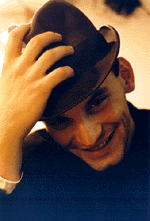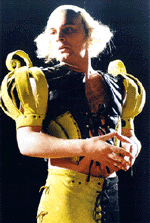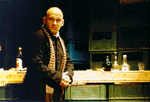

| Gergely Zöldi: | "I guess that almost everything depends on the energy. On our not being indifferent." |
Conversations with Roland Rába
 Roland Rába 40 KByte |
One of the great surprises of this year’s Film Week- and the winner of the Best First Film Award - has been a work by the college film-student Kornél Mundruczó titled Desires I Have None. One of the film’s leading roles, the character of the gay prostitute, is played by Roland Rába. He is an actor of the Katona József Theatre but Árpád Schilling’s Krétakör Színház (Chalkmark Theatre), of which he is a founding member, is just as important in his life. A TV-series titled Someone Is Knocking is also about to go on air, in which he is the leading character, too. But first, let’s talk about the award-winning movie… How did this film happen? I think it was the first time that a second grade film student’s work appeared on the Film Week. The director, Kornél Mundruczó was my class-mate in the Theatre Academy, doing acting studies at the time. Then he went on to study film directing and started to work with enormous energy and very creatively, making several short films. Now he got an opportunity: discarded film material for free, onto which he could still work. This is how it was possible for him, a second grade student, to be there at the Film Week. Also, since he has known many of us actors working in his picture for quite a while, it was easy for him to ask us to help him get the film together. Does this mean that you worked for free? Certainly. Not only the young actors, but also such recognised ones as Ági Szirtes or Imre Csuja. As far as I know the whole thing was made on a friendship basis. Everyone is surprised how one can make a film nowadays of very little more than a million forints - as a matter of fact, post-production cost more than the film itself. It’s obvious that if you are inventive, then it’s possible. How long did the work last? I worked about twenty days but there were others who worked more. Ervin Nagy, who is my colleague at the Katona as well, had a somewhat bigger role, so he shot more days. So, low budget didn’t mean that you had less time for the shooting. No, from this point of view this was a completely "normal" shooting. What’s the story? It’s about a small family, a brother and sister (played by Martina Kovács) and the girl’s husband who is played by Ervin Nagy. I play the brother. The two of us, the brother and the husband work in Budapest, for a while nobody knows what we actually do - then it turns out that we are prostitutes. The brother is in love with the sister’s husband, or rather there is an extremely strong friendship between them - which of course means much more than that for him. The husband is in an impossible situation, he strives to exist somehow between the two siblings. This causes a lot of conflicts and finally the whole thing ends up in tragedy. It wouldn’t be ethical for me to say more than that. Was this your second film engagement after Someone Is Knocking? I had made short films before, more like trying to learn the job. I worked in films of the directors/cinematographers’ class that made Someone Is Knocking. As far as the series is concerned, the class had an assignment to make a series. That is, they had to analyse a story in a way that each of them directed one episode of it. They got Sándor Török’s novel about the protagonist moving from flat to flat and his life changing all the time - because he keeps moving to better and better circumstances. By the way, I will soon surpass him in changing flats: I’m about to move into my eighth sublease. So, the film-students dramatised the eight episodes and finally they chose me to be Sándor Török. On what basis? Obviously because they knew me, we had worked together before. What I enjoyed in this the most is working with eight different directors, eight cinematographers, eight costume designers and art directors. We spent the whole summer of 1998 with this work, I shot for seventy-four days. We also worked on Saturdays and Sundays. Who were your partners? A lot of actors, because every episode had new characters. From Hédi Temessy through Enikő Eszenyi, Dezső Garas, Andrea Fullajtár, Kati Takács, Sándor Almási to Ila Schütz and Gyula Bodrogi, many people. Have you seen the picture? Yes, they showed it on last year’s Film Week. I didn’t see every episode but almost all of them. In the first ones I didn’t really like my performance, but it seemed that later I started to get more comfortable. Besides the obvious professional advantages of working on film, did it mean any other attraction for you? I’m thinking about fame or getting more jobs later on… In 1993, when I won the audience prize at the What Are You Good At? contest, I felt this for a moment, but I was nineteen then - at that age one sees this very differently. At that time it was enough for me to recite a poem three times on TV and I immediately got letters, I was recognised, reporters wanted to contact me. But getting back to what I think you wanted to ask, it’s possible that an actor reaches a point when, even knowing that what he is about to do is bad, he would still accept it for the sake of popularity - but I haven’t reached that point yet. It is a common question in actor-interviews but I can’t help asking: have you always planned to be an actor? I’d say yes. I hesitated for a while when I considered becoming a priest but I wasn’t admitted to any school. It hurt then, but now I don’t regret it at all. But already at primary school I played a lot of roles, from Valiant János to Lenin, everything. Were you sure of yourself? I mean, did you know that this is the real career for you? I don’t know. The reactions were very important, but those were positive, so there was no problem with that. Of course they are only important in a given moment, because once you have achieved something, the result loses its value to some extent. You simply acknowledge that you succeeded and you step further. I was admitted to the Theatre Academy, which was pure joy, but the next step was realising that now I have to do something with the opportunity. Then the Katona offered me a contract and after the first euphoria I had to face the problem of how I can do something good and important in the theatre? Within the company or do you mean personal initiations? Of course within the company, too, but there you are much more dependent: you play what they give you. You certainly have ideas and you would like to realise them - but that takes money. Kornél’s film is important because it shows that you can do a lot of things without money, what’s more, do it in a good atmosphere. The series was made of incredibly little money, too, we had about a million forints for each episode. So it’s possible, that after all, money is not the single most important factor. As long as you can afford not being paid, it probably isn’t. But what happens when you start to have financial responsibilities and you can’t afford to work on a friendship basis? This certainly can happen, but I don’t have a family or children yet and I think that I can support myself even if not everything works perfectly. If success also means money, then it’s wonderful. But I find experimenting and realising your ideas much more important. I guess that Árpád Schilling is a significant partner of yours in this… I got to know Süsü in Zalaszentgrót, at the Ascher summer stock when we were seventeen. Already then we were planning a theatre. This has been a long process going on for about ten years. It’s great to see that Süsü has success, that he is becoming a serious artist as a director. And these long-time relations make communication so easy - he obviously builds upon them when he gathers people for a project. This may be one of the strong points of a constant company, you have discussed everything, certain problems needn’t be talked about at all. I also love the work ethic and spirit that is so typical of the Krétakör Színház. Do you see any film making teams that you would like to be a part of? It was very good to work with Kornél Mundruczó - but that’s a strange situation because I got to know him as an actor. It was quite unusual for me to have him as a director. But he did a great job, I could trust him and it was worth listening to him. It was also good to work in the series, to see the different directors’ work, to adapt to their worlds. Do these people represent totally different styles? Do the episodes of the series show obvious stylistic differences? They do. You can approximately tell how they would like to express themselves. Some are bolder, some are more careful… Do you see some that could become great directors? There were some, actually almost all of them have the possibility of this. I think almost everything depends on the energy. On our not being indifferent, on our will to create something, on our not expecting solutions from the outside. Even if the situation is difficult, we have to pull ourselves together. Are you able to do it? This is a problem for me, too. When I have no work to do, I feel excellent doing nothing. I love sitting around and watching TV… Aren’t you tense when you don’t work? I’m not. I have other things for those times. I try to do things that I normally don’t do. That’s the time to go to the cinema more often… But I also have little time for going to the theatre when I work. Are there places to go? There would be. I would see my ex-classmates. I am very much behind, because since college, but actually even before getting my degree, I have always worked a lot. I always did something and I almost never had time to get lazy. Was this your choice or did they always find you with something? Two summers ago we did the film, then I started my season at the Katona. After that I played Liliomfi in Tatabánya, then in the summer I did Love Or What You Will with Süsü. This took the whole summer, we played twenty-four performances in different cities of the country. In this performance you changed roles with Árpád Schilling at the last moment. How did that happen? We kept rehearsing and he felt that he couldn’t cope with the prince’s role. By the way, he is a very good actor, he was probably the best of us when we were at the Ascher summer stock. Still, this thing didn’t seem to work for him. It wasn’t his fault, he just got frightened that he wouldn’t be able to do it. The prince’s role wasn’t too big at first, but then it started to grow. I enjoyed the first concept of me playing the clown who keeps communicating with the audience…but then we changed and I took over the prince - indeed in the last moment. It seemed that you were quite in place in that team. It was really a great company. I was a little worried of being closed together, but it ended up very well. I have seldom felt as great as last summer on the Love… tour. And I can thank this to the actors Annamária Láng, Eszter Ónodi, Lilla Sárosdi, Gergő Bánki, Viktor Bodó, Sándor Terhes, András Winnai, the director Árpád Schilling, the producer Máté Gáspár and the technical helper Balázs Erős. It was a great team. In the autumn you started something new again… Yes, I went to play Orestes in Győr, then we did Cerceau in Kamra, directed by Andor Lukáts, in which I play a forty-year old Swedish man. And now I am preparing with Süsü for our upcoming production titled Nexxt. This has something to do with film as well, or rather with the Internet and TV. The performance tries to conjure up a TV-show with all of its requisites. That is, the theatre itself is going to be the show with the audience being the audience of the TV-show. We have a contract about putting the first performance on the Internet and pre-production will also be possible to follow on the Net. And if we come across with a problem, the viewers can help us through the Internet. So Kétakör Színház will have a regularly updated homepage providing information on what’s going on with the project. Will you make a film about it? Maybe not about this, but we did make a film of the summer tour of Love… - we just have to put it together. We have about thirty hours of material because we had a film crew with us shooting during rehearsals, performances, everything. If I’m correct, you also use film effects in Nexxt. Does Árpád Schilling have ambitions in film? This is something that only he could answer to. There will be a report for the audience of the show about looking for the "target person" - somebody like the "whisky thief" - for instance a camera will be placed into a bottle on the table and it will provide a live transmission on what he is doing. In this respect Süsü is experimenting with film, which is of course a totally different kind of work than theatre, so these scenes need to be rehearsed a lot. By the way, do you have your "basic films"? Your personal favourites? The first was Brother Sun, Sister Moon, which I loved as a child. Now I see that it is a little mushy, or just "too much". But what I still like is Blade Runner. I am extremely fascinated by the future, for instance the age of spaceships. But not the way it is happening today, rather what you see in science fiction movies. I am interested in a world where everything is a little bit empty, but it still has a lot to it… I can’t explain it clearly. I’m not afraid of these changes, of the rule of computers, of the possibility of doing something without leaving your room. This enormous communication boom excites me more than it frightens me. What I regret is that I will miss the completion of it. Flying vehicles, incredible distances, I’d love to try this kind of existence. You won’t necessarily miss it. If you look at what has happened in the past twenty years… Right. But I still doubt that I will live to see for example the age of robot-men. I’m interested in the essence of it, which is very well described in Blade Runner. Of course The Fifth Element and Brazil is also like that, but they only emphasise the negative side. They show how depressing, crowded and controlled that life would be and how you cannot be yourself in it. But compared to the old times our present age would seem the same and still, man feels quite all right in it. Do you? I do. I’m always excited by the present and the future. This is why I like the sci-fi films, even when the topic is cheap. Hungarian film hasn’t got much to do in this field. That’s really not our genre. Still, it’s great that there are films being made here. You can tell them off, but what’s the point? Would you like to take part in one of today’s fashionable Hungarian commercial films? Yes. Obviously, it’s not an actor’s job to have prejudice about things. If you have a role to play, then you must play it very well. If you are in a position to make choices, then your choice is really a responsibility. Then you must decide what to give your name to. But until then you must be happy if they call you. Isn’t it dangerous to step onto such a way? You might discredit your name with certain things… You have the right to say at any point, thanks, I’m off. You can also say, yes, I’m taking part but not among these circumstances. But I think that you do have to take part and if you don’t like the rules than you have to change them - from the inside. As an aristocratic outsider you don’t have the slightest chance for that. So you wouldn’t say no to any offer? If I got to a point that they want me personally for a job - for example a commercial - and I would have a chance to have input, then why not do it? But I don’t push too hard to be in any of them, I don’t build contacts. It would be great if I did theatre productions and films that are good and that would make me reliable for such works as well. But I don’t give priority to this, because doing commercials is not an actor’s job, even a bad popular film is better than that. As an actor, I think it’s a better feeling to play a role in any bad movie than doing commercials - although, the latter undoubtedly pays off very well. Maybe the difficult thing for you, young actors is that it’s very hard to get recognised through serious work. The actors that "only" do their job, are known by very few people. But once you make compromises with your talent, you become a star. Yes, this profession has been devalued. But I’m not really prepared to be a public figure anyway. If I was suddenly asked to, I wouldn't know which parts of my personality I would be willing to share with strangers. So, as far as I’m concerned, there’s no problem with that at all. I will slowly find out the way in which I can present an image about myself creatively and inventively - an image that I think concerns others, what’s more, might even interest them. Anyway, I’m striving to find a way to do that.
|  Roland Rába and Enikő Eszenyi in Someone is Knocking 57 KByte
|  in Someone is Knocking 54 KByte
|  István Tasnádi: Public Enemy (staged by the Katona József Theatre) 60 KByte
|  Luca Caragiale: The Lost Letter (staged by the Katona József Theatre) 78 KByte
|  Zoltán Egressy: Portugal (staged by the Katona József Theatre) 88 KByte |